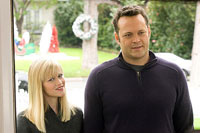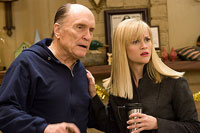Silly and frivolous though it may be, Four Christmases is nevertheless a movie that speaks loudly about the time and place in which it was created. Intentional or not—and, with a movie this unabashedly and straightforwardly fun, it’s probably not—it’s a film that bears witness to the crisis facing the very institution of family, a movie that surveys a culture in which disunity is becoming more commonplace than familial bonds, in which shallow attraction and infidelity are more popular than real love or commitment. It’s not a great work of art—not even close—and it’s not a pointed piece of social commentary, but it’s a telling and revealing movie just the same.
Its very premise is based in the prevalence of broken families in our society. Vince Vaughn and Reese Witherspoon star as Brad and Kate, an unmarried couple so stubbornly intent on avoiding their fractured, feuding families that, every Christmas, they stage a fake humanitarian crusade to some distant third world country and then hop a plane to the beach, enjoying fun in the sun and forgetting their families altogether. Or at least that’s their habit, until one fateful year when bad weather grounds every plane in the city, their families find out about it, and the two are forced to spend Christmas Day visiting each of their four families—his dad, her mom, his mom, her dad.
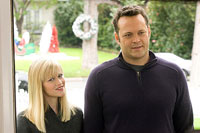
The movie is funny and cute, but its very story mandates that divorce and brokenheartedness are always lurking somewhere around the edges. And, much to his credit, director Seth Gordon, in his first mainstream film (he also directed the arcade documentary The King of Kong, a minor hit on the indie circuit), shows a keen understanding that even comedy comes with responsibility, and he strikes a fairly impressive balance, using the awkward, pointed humor to draw our attention to the seriousness and sadness of the situation without making the movie unpleasant, overbearing, or misanthropic. It feels, at times, not unlike a good episode of The Office: We squirm a bit at how uncomfortable it is, like when Kate’s sister reveals embarrassing secrets about Kate’s childhood obesity and social gawkiness, or when we find that Brad’s mom has married a man who is literally the same age as her own child. But it’s a good kind of squirming, because it reminds us that there’s serious darkness and dysfunction, both here and in the real world, that needs dealing with. And it does so—crucially—without losing sight of the fact that this is really just a big, mainstream, crowd-pleasing bit of silliness.
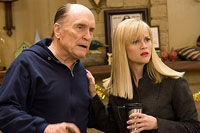
And it is silly, not to mention a lot of fun. Vaughn does what he does best, dry and deadpan as always, but perhaps the real MVP here is Witherspoon. If the Best Actress winner is trying to prove that she can handle frivolous comedy just as well as she handles Oscar-bait drama, she succeeds marvelously, more than holding her own with Vaughn and coming across as funny, cute, and smart. She makes a strong case for allowing women into the Frat Pack—one imagines that she could easily steal the show even from someone like Will Ferrell. There’s also a big cast of supporting actors, all of whom are fine, if not necessarily brilliant; Robert Duvall is mostly wasted but scores a few good lines as Brad’s dad, Sissy Spacek is just sort of weird and creepy as his mom and Mary Steenburgen continues her inexplicable streak of silly mainstream comedies, following Step Brothers from earlier this year. Meanwhile, Dwight Yoakam is nearly unrecognizable as a balding country pastor and Kate’s would-be step-dad, and Jon Voight does well enough as Kate’s real dad with what is basically just one brief monologue.
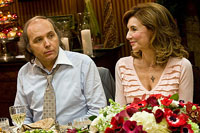
It’s a well-done movie even beyond the casting, very funny and often surprising. Its plot, clearly divided into four parts, could easily have felt like four separate skits, stitched together into one big movie, but, thankfully, it never sinks to that, as the character development of Brad and Kate holds it all together. Indeed, though the movie is ostensibly about the relationship between this couple and their families, the heart of it is really about them—about an initial aversion to responsibility, but a growing desire in Kate to have a commitment (i.e., marriage) and a family, in spite of her own bad family experiences.
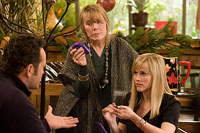
She and Brad wrestle with these issues—issues of a hurtful past and a hopeful future, of love and fidelity and responsibility—and the movie goes out on an optimistic note. But of course, no amount of healthy communication or human love could ever repair a broken home, let alone a culture that’s full of them. The need for grace is clearly felt, as the film wrestles—admirably—with some big questions, but alas, never looks to Christ for resolution. But the movie still deals with tough realities, and it does so in a way that’s honest and gracious. Add to that the fact that it’s very funny, very touching, and very real, and it’s not too hard to believe that, though it won’t win any awards and it might not be remembered as a classic, it’ll become a holiday favorite for many.
Talk About It
Discussion starters- Why do Brad and Kate avoid their families the way they do, and why are they reluctant to commit to one another with marriage or children?
- What changes do we see in Brad and Kate, and what causes them?
- Of the various parents and family members, which seem to behave the most admirably? The least admirably?
- What view does the movie take of responsibility and commitment?
The Family Corner
For parents to considerFour Christmases is rated PG-13 for sexual humor and language. The frequent sexual humor includes a bit of innuendo, but doesn’t resort to raunch or explicit language. The language is for mostly mild profanities. It’s definitely not for kids, and parents of teens will want to show discretion, but it’s not as objectionable as most PG-13 comedies tend to be. It portrays broken families with frankness, but has surprisingly positive things to say about family and commitment. Christian audiences will also note that there is a scene of a Nativity pageant that treats the biblical narrative with what might be seen as irreverence, though it’s really making fun of the characters in the movie, not the ones in the Bible, and certainly not of Jesus.
Photos © Copyright New Line Cinema
Copyright © 2008 Christianity Today. Click for reprint information.

